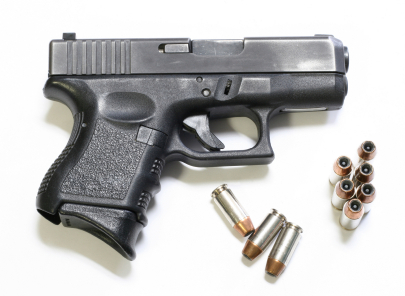NOTE: This article was refreshed to include new information on Illinois criminal law after passage of Public Act 101-440. This Act took effect on January 1, 2020, adjusting the availability of good behavior sentence reductions in certain situations.
The State of Illinois has some of the nation’s toughest laws on firearms. It is tragic, because Chicago is one of the most violent places in the United States. If there is any place in the nation where a person might need a firearm for protection, it could be Chicago.
Although the Second Amendment gives each person the right to bear arms, each state can regulate aspects of gun ownership or possession. In Illinois, it is a serious offense to carry a loaded gun. The offense is called aggravated unlawful use of a weapon, and it is a felony crime.
Time and time again, the Chicago Tribune runs a story about an out-of-state resident who comes to Illinois with a firearm for protection. Often the person is from Indiana, deciding to carry a loaded handgun while visiting Chicago.
It is a tragic story each time. The fact that it is an out-of-state resident, even if they possessed a valid out-of-state firearms license, is not a defense. The fact that they were ignorant of the law is not a defense, either.
The criminal charge of aggravated unlawful use of a weapon is referred to by lawyers and judges as “Agg UUW.” The crime is found in the criminal code at 720 ILCS 5/24-1.6.
Aggravated unlawful use of a weapon is categorized as a Class 4 felony. If guilty, the defendant can be sentenced to 1 to 3 years in the Illinois Department of Corrections and may be fined up to $25,000. The law says that the judge is permitted to sentence the defendant to probation as opposed to time in custody.
However, the policy of the Cook County State’s Attorney is to seek a prison sentence in every case. Basically, Agg UUW defendants can get caught in a political debate concerning firearms cases.
The City of Chicago is stricken with a high crime rate and multiple shootings on a daily basis. In response, prosecutors tend to seek the maximum penalty on every case. Even for a defendant with no criminal history whatsoever, the prosecution will often seek a prison sentence.
Many people are confused about the name of the charge because they did not use the weapon. But it does not depend on firing or brandishing the gun. Simply possessing a loaded gun is considered aggravated unlawful use of a weapon.
Elements of Aggravated Unlawful Use of a Weapon
The elements of aggravated unlawful use of a weapon involve possessing a firearm:
- On your person or in your vehicle; or
- 2. When you are not on your land, your residence, or your fixed place of business.
Additionally, any one of the following elements must be present:
- The firearm possessed was uncased, loaded, and immediately accessible. 720 ILCS 5/24-1.6(1)-(3)(A).
- The firearm was uncased, unloaded, but the ammunition was immediately accessible. 720 ILCS 5/24-1.6(1)-(3)(B).
- Regardless of whether the firearm was loaded, the person possessing it did not have a Firearm Owner’s Identification Card (FOID). 720 ILCS 5/24-1.6(1)-(3)(C).
The statute provides additional elements which would subject a person to the charge of aggravated unlawful use of a weapon. For example, a person can be charged with the felony if they were engaged in the commission of a misdemeanor offense, had an order of protection issued against them within the last two years, or possessed a handgun while under 21 years of age. Though aggravated UUW charges under these circumstances are less common.
Sentencing for Aggravated Unlawful Use of a Weapon
A second or subsequent offense of aggravated unlawful use of a weapon is a Class 2 felony with a mandatory prison sentence ranging from 3 to 7 years. The court is not permitted to sentence the defendant on a second offense to probation. Rather, a second offense is non-probationable.
The primary means of defending a charge of aggravated UUW is to challenge the search that produced the weapon or establish reasonable doubt as to possession of the firearm.
The questions that should be asked are:
- How did the police gain access to the firearm?
- Did the police have a search warrant?
- If not, did the police have probable cause to allow them to search the person or the vehicle?
- Did the defendant possess the gun or someone else?
If a person is convicted of aggravated unlawful use of a weapon and receives a prison sentence, they may be eligible for a reduction. Under the Truth in Sentencing laws in Illinois, good behavior can result in a maximum reduction of 50 percent. But if the offense in question was violent in nature, the offender may be required to serve 85 to 100 percent of their sentence.

